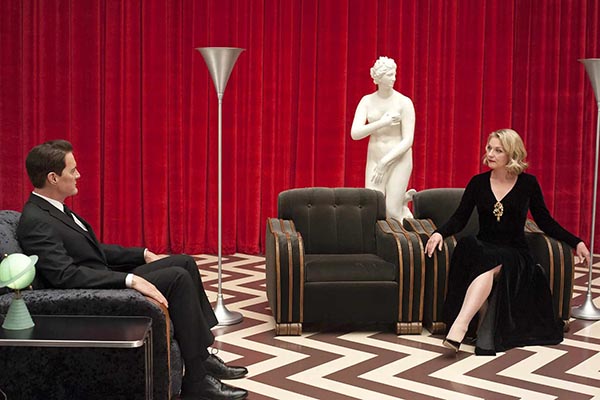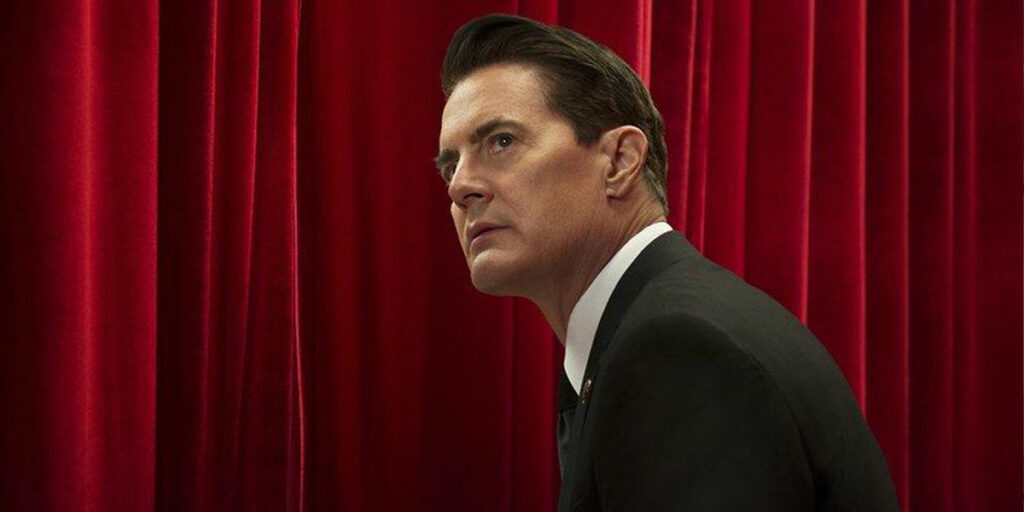In times where TV status is losing its meaning, Twin Peaks: The Return still represents a challenging rupture in conventional storytelling.
Twin Peaks: The Return celebrated 5 years last month, and it’s David Lynch’s last big project. Reuniting many members of the original cast with a set of new characters and, notably, many movie stars, the show returns with an unconventional structure and, curiously, takes place mostly outside of the small town of Twin Peaks. The first episodes feel like a jigsaw puzzle being mixed up to be played again, with a number of seemingly disconnected plots taking place at the same time. However, every Twin Peaks fan who watched The Return in its premiere had one question in mind: what the hell happened to Cooper?
Kyle MacLachlan returns to this role 25 years later, as Dale Cooper still finds himself trapped in the black lodge. Parallel to that, there’s an evil doppelganger of his plotting something wicked, a strange murder that attracts the attention of a familiar group of FBI agents, mysterious events taking place in the small town of Twin Peaks, and well… A whole bunch of other weird stuff. It’s a delight to see Lynch with total creative freedom, but, in exchange for that, The Return renounces a lot of the corny drama so present in the first two seasons. There are still hints of the show’s cheesy comedy, especially in the Twin Peaks plotline, but the whole series is much more reminiscent of Fire Walk With Me, the prequel movie that showed the last days of Laura Palmer (Sheryl Lee).
Lynch is much more comfortable in freely addressing avant-garde and experimental techniques that blend masterfully with the darker subjects of the show, and that was a big yes for me. The first three episodes masterfully deliver the weirdest moments of the whole show and it actually made me wish all this insanity blended better into the twisted, yet grounded narrative that went on. Which leads us to the question that remains without an answer after all these years: is Twin Peaks The Return a movie or a TV show? The fact that we actually need to ask ourselves that in order to understand The Return’s purpose bothers me a lot, and reflects TV’s growing obsession with reaching cinematic appeal with their content. The first thing to consider, naturally, is how the TV industry itself has drastically changed since streaming services became a thing.

Not so long ago, TV shows were programmed to meet the season’s schedule, aiming to attract the largest audience, usually in a long run of 22 weeks. For that reason, it was extremely common to have seasons of 22 episodes, ranging between 40 or 60 minutes depending on whether the channel was paid or not. Now, with so many streaming services following their own schedule simultaneously, the competition is much more focused on subscribers than views, and TV show seasons just seem to be getting shorter and shorter. It’s supposed to reflect a search for quality instead of quantity, but in times where movies premiere straight on their respective streaming platforms, the notion of what’s TV and cinema intertwine.
But what does all that have to with Twin Peaks and why is it so controversial? Calling Twin Peaks: The Return a movie isn’t itself problematic, but it implies that cinematic status is something so much more elevated, that recognizing a TV show as a movie means that it no longer deserves TV status; it has turned into something greater. Such an assumption is detrimental to the entertainment industry because it displays TV content as something less relevant to the art scope. Moreover, Lynch’s name on the front establishes right away a level of quality that isn’t normally reached, because TV shows tend to be directed by multiple directors with different creative choices, and there’s also the studio supervision. And I say: fair enough, Lynch was given total control and he definitely knows what he’s doing. Even the low-quality CGI stuff looks as terrifying as it is groundbreaking in his hands. On the other hand, calling Twin Peaks one film divided into 18 parts is diving into a territory where everything needs to be labeled, and in this scenario, TV is portrayed as something less relevant.
A recent pop culture event was the fourth season of Stranger Things, which featured episodes that were 90 minutes long. Regardless of the undeniable quality of the show, such a strategy initially feels like an incapacity to tie so many plots together episodically but the showrunners have recently opened up about how it was the only way to adhere to the studio pressure and commissioned episodes. Unfortunately, in a way, everything still feels drastically detached when crammed all together. Twin Peaks: The Return is the opposite; it feels much more cut up than it should be, in a way that certain plotlines only feel slightly rewarding if you think of it as a film. In fact, the script was clearly structured like one; the show unravels in a linear course that doesn’t feel episodic at all, as countless plotlines drag for not only two, or three episodes, but the whole season. Each episode isn’t designed to catch our attention individually, but to add up to the very ending that, just like a movie, offers one final conclusion (I mean… you know Lynch). However, the ending only feels so cathartic because it represents the major payoff viewers were waiting for 18 episodes straight; the moment where all those seemingly isolated storylines would finally collide.
In this scenario where TV shows seem to be getting shorter, Lynch’s choice to opt for 18 episodes feels like a challenge to the industry, especially when the film vs TV matter comes into the picture. The whole TV industry is currently being designed like everyone’s time is being drastically reduced as years go by and days are no longer 24 hours long. The 22-episodes pattern was reduced to 13, or 12, or less. Even comedy shows feel like they’re rushing all their narrative to fit into a single punch line. As seasons get shorter, episodes get longer, because shows only catch the audience’s attention when drastically minimalized. TV is no longer about quality, it’s all about tricking time, just like judging a book by its cover. Somehow, Twin Peaks: The Return lingers in the center of it, offering a welcoming rupture to the TV structure, although it can easily backfire. Ultimately, I have no choice but to give credit to the show for being one of the most self-aware projects of the past years.

